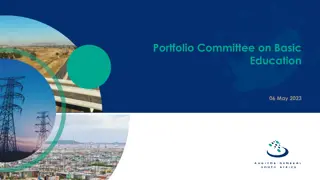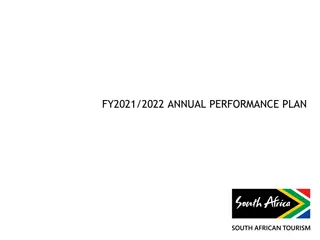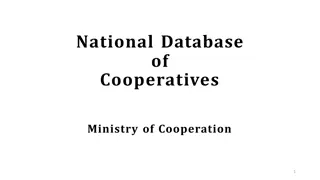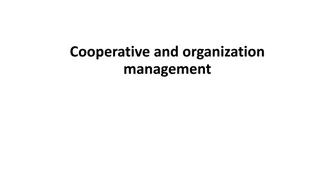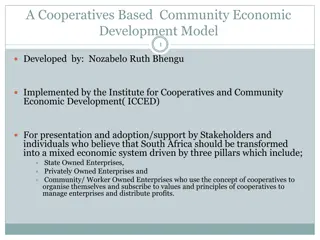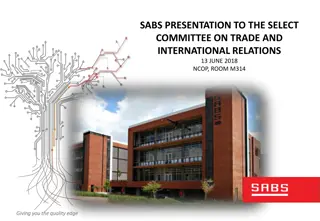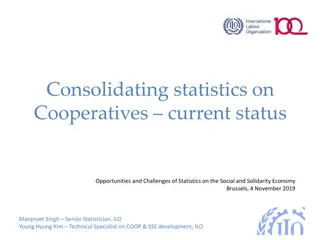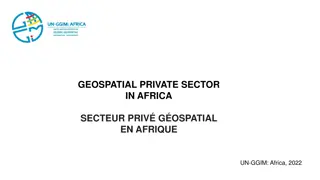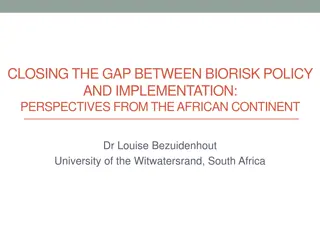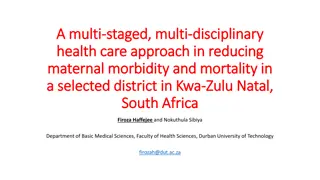Challenges Faced by the Cooperatives Sector in South Africa
The South African National Apex Co-operatives (SANACO) presented on the limitations of the cooperatives sector in South Africa, highlighting challenges such as a hostile environment, lack of government procurement support, resource mobilization issues, and coordination problems. The government's Economic Reconstruction and Recovery Plan aims to address unemployment and poverty by utilizing cooperatives as agents of socioeconomic development.
Download Presentation

Please find below an Image/Link to download the presentation.
The content on the website is provided AS IS for your information and personal use only. It may not be sold, licensed, or shared on other websites without obtaining consent from the author. Download presentation by click this link. If you encounter any issues during the download, it is possible that the publisher has removed the file from their server.
E N D
Presentation Transcript
1 South African National Apex Co-operatives (SANACO) presentation Topic: Limitations of the Cooperatives Sector in South Africa. 22 June 2022
Table of content 2 Introduction. The state of cooperatives in South Africa. Limitations of the cooperative sector in South Africa. Proposed interventions Membership of cooperatives globally Principles of cooperatives Conclusion
INTRODUCTION 3 The majority of the communities are facing hardships, unemployment and poverty and hence the government s decision to make coops as agents of social economic development. The South African government has adopted the NDP vision 2030 in line with the SDP adopted by the UN. The NDP endorse special measures to support cooperatives as part of strategies for job creation in the economy.
INTRODUCTION 4 In order to address the high rate of unemployment and poverty, the government came up with the concept of Economic Reconstruction and Recovery Plan (ERRP) as a direct response to the global crisis caused by the COVID 19 pandemic as well as the war between Russia and Ukraine. This presentation identifies challenges is addresses limitations in the cooperatives sector in South Africa and goes further to propose interventions by all stakeholders.
THE STATE OF COOPERATIVES IN SOUTH AFRICA 5 In 2019 the new democratic government launched the Cooperatives Development Policy and later in 2005 promulgated the cooperatives Act, No. 14 of 2005 as amended. In 2020, the Cooperatives Act No. 06 of 2013 was signed into law. The Act has called for the establishment of the Cooperatives Development Agency; cooperatives tribunal; Ministerial Advisory Committee as well as the cooperatives academy. The Department of Small Business Development host the legislation on cooperatives.
Limitations of the Cooperatives sector 6 Noting that the majority of registered cooperatives are in the agricultural sector and spread beyond the ten (10) identified sectors identified in the act. Our observation as the cooperatives sector in the country is that: The environment is generally hostile towards cooperatives in South in relation to high costs of energy needed for production; Government the main driver of job creation and enterprise development does not have appetite in procurement of goods and services from cooperatives There are challenges with regards to the resource mobilization of cooperatives which includes attracting qualified personnel as well as funding to sustain the cooperatives. A lack of coordination amongst government and development finance institutions on support for cooperatives which intern promotes competition amongst cooperatives which is contra opposite the principle of cooperation amongst cooperatives.
Limitations continued 7 The advent of COVID-19 pandemic present a new challenge of technology and data affordability hence cooperatives sector is left behind in the 4th Industrial Revolution. There is a lack of both technical and business skills amongst cooperative members and the inability of cooperatives sector to attract graduates from our institutions of higher learning in the country.
Proposed interventions 8 Government should fast track the implementation of the new cooperatives act and establish the Cooperatives Development Agency (CDA), Cooperatives Tribunal, Ministerial Advisory Body as well as the Cooperatives Academy. We should deliberately set aside the procurement by the state of commodities and services for cooperatives. In line with the ERRP, government should facilitate procurement between the private sector and cooperatives so that some of the goods and services can be procured from cooperatives. E.g. The sunflower supply crisis caused by the war between Russia and Ukraine. Government should cut the red tape on the funding for cooperatives but ensure that supported cooperatives are sustainable through partnership with the movement of cooperatives in the country. Government should ensure that there are identified applications and websites that must be accessed across all network providers for free by cooperatives.
Interventions continued 9 The cooperatives sector should be placed at the heart of the Independent Power Producers. This will ensure that communities are not spectators but active participants in the renewable energy sector.
Principles of Cooperatives 11 Cooperatives operate on the basis of principles and ethics of good practice; Open and Voluntary Membership Democratic Member Control Member Economic Participation Autonomy and Independence Education, Training and Transformation Cooperation among Co-operatives Concern for Communities
CONCLUSION 12 SANACO should assist the cooperatives to be united in search of excellence, effective delivery, good governance, professionalism, accountability, equity and effective administration. SANACO should champion the cooperatives to be visionary, competent and caring. Cooperatives in South Africa must become the learning organisations and inculcate a culture of research, harnessing intellectual debate and encouraging learning, education and development.
How to contact us 13 Name E-mail address Mobile Lawrence Monyahi monyahi79@gmail.com 072 119 8171 Lawrence Bale presidentrsacoop@gmail.com 076 974 2630 Office Located 357 Visagie Street PRETORIA CENTRAL 0001
14 THANK YOU


